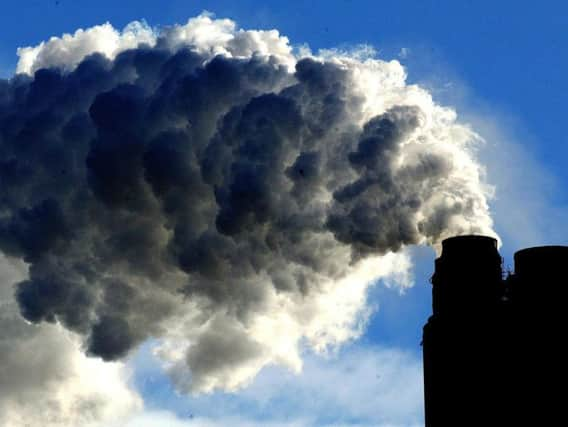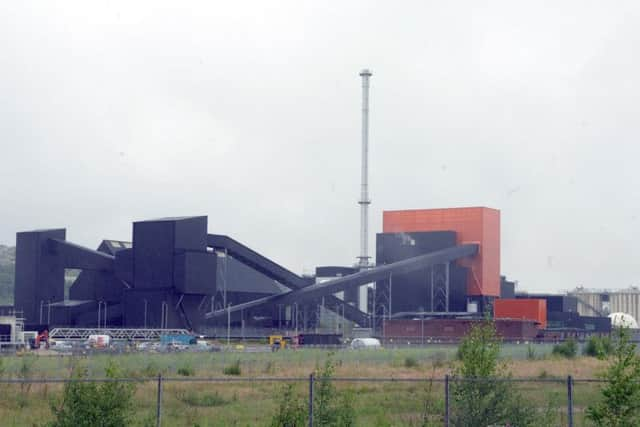Carbon emissions fall in Sheffield, but city 'has a long way to go'


Levels of the pollutant being pumped into the atmosphere have dropped steadily from 5.6 tonnes per person in 2011 to 4.8 tonnes in 2016, the latest government statistics show, despite a slight increase from 4.5 tonnes in 2015.
During the same period, figures from the Department for Business, Energy and Industrial Strategy show, CO2 emissions across the UK fell more sharply from 6.7 tonnes per person in 2011 to 5.4 tonnes in 2016.


Advertisement
Hide AdAdvertisement
Hide AdBut the spike in emissions within Sheffield between 2015 and 2016 has prompted concerns from environmental campaigners.
Transport emissions were up 1.7 per cent that year but the most pronounced increase was in emissions from the use of gas for industry and commerce, which more than doubled from 353 to 769.4 kilotonnes.


Douglas Johnson, a Green Party councillor in Sheffield, said: "CO2 is the big driver behind climate change and clearly Sheffield has a long way to go, with the city being in the top five when it came to the largest increases (10 per cent) between 2015 and 2016 in CO2 emissions within the scope of the local authority.
"Against a background of steady reductions, Sheffield actually doubled the amount of its CO2 emissions from industry and commercial gas in 2016, compared to 2015.
Advertisement
Hide AdAdvertisement
Hide Ad"However, it is noticeable that the really big emitters of CO2 in Sheffield are the Blackburn Meadows biomass plant, which only came onstream in 2014, and the Bernard Road incinerator, which has steadily increased CO2 outputs over the last decade."
His Green Party colleague Eamonn Ward claimed more action on climate change was needed in Sheffield, especially with developments including the new Ikea store and Meadowhall extension being encouraged in the east end of the city.
"The last Air Quality Action plan in 2012 set targets for 2015 which were not achieved and no new plan has followed," he said.
"Sheffield has seen no significant action for better public transport and safer cycling and walking options so people can choose to leave their cars at home, to reduce congestion for all road users and improve dangerous air pollution."
Advertisement
Hide AdAdvertisement
Hide AdIn Sheffield, 2.78 million tonnes of CO2 were produced during 2016.
The transport sector accounted for 23.6 per cent of that total, households were responsible for 29.3 per cent and industrial and commercial activities produced the remaining 47.1 per cent.
This summer's heatwave has focused attention on climate change, with scientists predicting CO2 emissions will make such extreme weather more common in future.
Jason Torrance, a transport expert at UK100, a network of local governments committed to promoting clean energy, called on the government to act urgently to reduce transport pollution.
Advertisement
Hide AdAdvertisement
Hide AdHe said it would take 'significant' changes like electrifying more railway lines, introducing cleaner buses and taxis, and reducing people's dependency on cars by designing cities better to bring down emissions.
"There is £78.5 billion of planned government spend on transport infrastructure in England to essentially increase road capacity. That will worsen the problem rather than decarbonising or tackling air pollution," he added.
Phil MacDonald, analyst for the climate change policy think tank Sandbag, claimed the UK has made some progress on energy efficiency, particularly through the quick uptake of LED lightning, but there was work to do.
"Compared to the continent, our housing stock is coming from a low base. There's a lot more to be done in reducing domestic emissions, and much of it, like loft insulation or cavity wall insulation, pays back in reduced energy bills almost immediately," he said.
The Star approached Sheffield Council for a comment.
Advertisement
Hide AdAdvertisement
Hide AdCO2 EMISSIONS IN SHEFFIELD DURING 2016 (2011 figure in brackets)
Industry and commercial: 1,318.6 kilotonnes (1,353.5)
Domestic: 821.6 kilotonnes (1018.5)
Transport: 661.0 kilotonnes (673.2)
Total: 2,776.1 kilotonnes (3,021.8)